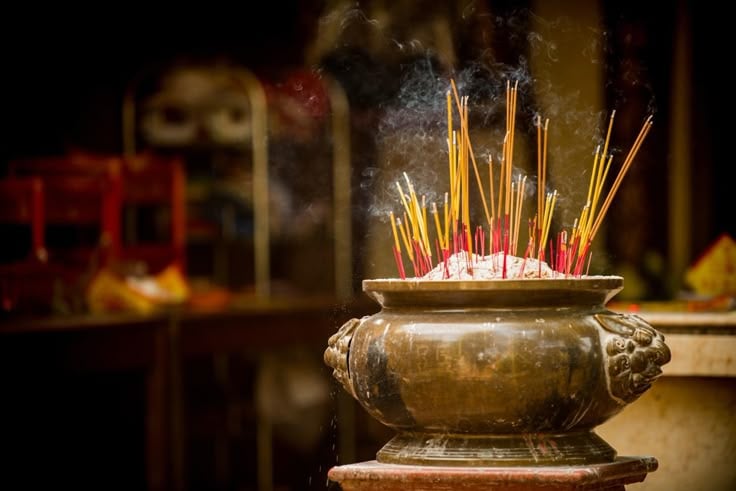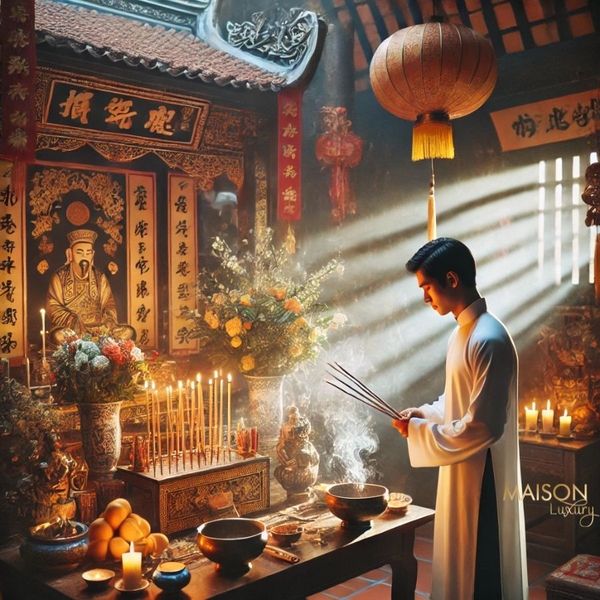The first day of the lunar month is a sacred time in Vietnamese spiritual culture, with many families offering prayers and incense to usher in a prosperous and peaceful month. However, there are certain taboos associated with burning incense on this day that not everyone is aware of.
Incense burning is an act of reverence and a spiritual practice, so our ancestors advised against ignoring these taboos, especially the three mentioned below:
1. Avoid burning incense at night – A major taboo that invites negative energy into the house
According to feng shui and folk beliefs, the timing of incense burning is crucial. Many people, due to their busy schedules, only find time at night, but this is a major taboo when it comes to worship on the first day of the month.
The night is when yin energy is at its strongest and yang energy wanes, making it easier for wandering spirits and negative forces to enter, especially if the doors are open and the flickering light of the incense creates an inviting ambiance. Burning incense at night is also believed to open a gateway for negative energies, leading to instability in the household, problems in endeavors, and health issues.

In reality, the night is when families relax and rest, and burning incense at this time can create an association with the cold and eerie underworld, causing fear in those who are more susceptible to such influences.
Suggestion: The ideal time to burn incense on the first day of the month is early in the morning, between 5 am and 9 am, when the air is fresh and pure, and yang energy is at its peak, ensuring smooth energy flow.
If you’re pressed for time, it’s best to prioritize burning incense before 11 am to prevent negative energies from entering your home.
Under no circumstances should incense be burned after 7 pm, except on special occasions like New Year’s Eve or major full moon festivals, and even then, adequate preparations should be made.
2. Keep the doors open when burning incense – A major taboo that blocks the entrance of deities and ancestors
A common mistake is to keep the doors closed when burning incense, especially if the house has air conditioning or to prevent the smoke from spreading outdoors. However, this inadvertently becomes a major taboo in feng shui.
In folk beliefs, when burning incense, the doors should be left open to invite deities and ancestors to witness the offerings and accept the sincerity of the homeowner. Closing the doors not only blocks the entrance of these revered beings but also causes the incense smoke to stagnate, creating a gloomy and chilly atmosphere that diminishes the sacredness of the ritual.

In reality, burning incense with closed doors can affect the indoor air quality, as the smoke may cause respiratory issues, especially if the incense is chemically treated. This can be harmful to family members, increasing the risk of respiratory and even cancer, especially for children, the elderly, or those already ill.
Suggestion: Before burning incense, open the main door and windows to allow for air circulation and create a cleaner and more sacred worship space.
Once the incense has mostly burned down (or after you’ve finished your prayers for 10-15 minutes), you can close the doors if necessary.
Never allow the worship area to become stuffy, damp, or dark, as this directly affects the feng shui of the entire house.
3. Improper attire when burning incense – A major taboo that shows disrespect to revered beings
One’s attitude and appearance when standing before the altar of one’s ancestors, the Earth God, and the God of Wealth, among other revered beings, is a reflection of one’s sincerity. However, due to modern lifestyle habits, many people burn incense while wearing pajamas, sleeveless shirts, shorts, or disheveled clothing without realizing that this is a serious taboo and a sign of disrespect.
Ancestors, the Earth God, and the God of Wealth are all revered and sacred beings. Improper attire when burning incense is considered disrespectful and may result in these deities not witnessing the offerings, or even reprimanding the offender, leading to a loss of blessings and problems in one’s endeavors.
In reality, your attire reflects your personality, and your children will follow your example. So, to maintain a sense of reverence in the family, pay attention to your clothing, especially during worship, as this is when you should be at your most solemn and respectful, setting an example for future generations on how to show reverence.
Suggestion: When burning incense, opt for neat and modest clothing, preferably long pants and sleeved shirts in subtle colors.
Avoid pajamas, transparent or revealing clothing, miniskirts, or going barefoot in front of the altar.
Burning incense on the first day of the month may seem like a simple task, but it involves many spiritual considerations. Ignorance of these taboos can render one’s sincerity meaningless and even bring misfortune upon the household, making it difficult to maintain a sense of family tradition and values.
Always keep in mind these three major taboos when burning incense on the first day of the month:
- Avoid burning incense at night to prevent negative energies from entering your home.
- Keep the doors open when burning incense to invite deities and ancestors into your home.
- Dress appropriately to show respect and adhere to the proper rituals.
Additionally, when making offerings, ensure that the food is fresh, tasty, and of good quality, and be mindful of other incense-burning taboos, such as avoiding even numbers of incense sticks, refraining from moving the incense burner randomly, keeping the altar clean, and maintaining a calm and peaceful mindset during the ritual…
Being cautious, respectful, and adhering to the proper rituals, burning incense on the first day of the month becomes a sacred ceremony that attracts positive energy, dispels misfortune, and brings a month of peace, good health, and luck. This is not superstition but a reflection of your way of life.
Reference for spiritual contemplation
3 Types of Flowers Connoisseurs Always Keep at Home: Year-Round Blooms That Attract Wealth and Prosperity
Adorning your home with a few carefully selected flower pots not only adds a touch of freshness to your space but also brings prosperity and good health, according to ancient beliefs. The following three flower varieties are favored by connoisseurs for their ease of care, year-round blooms, and positive Feng Shui symbolism.





































